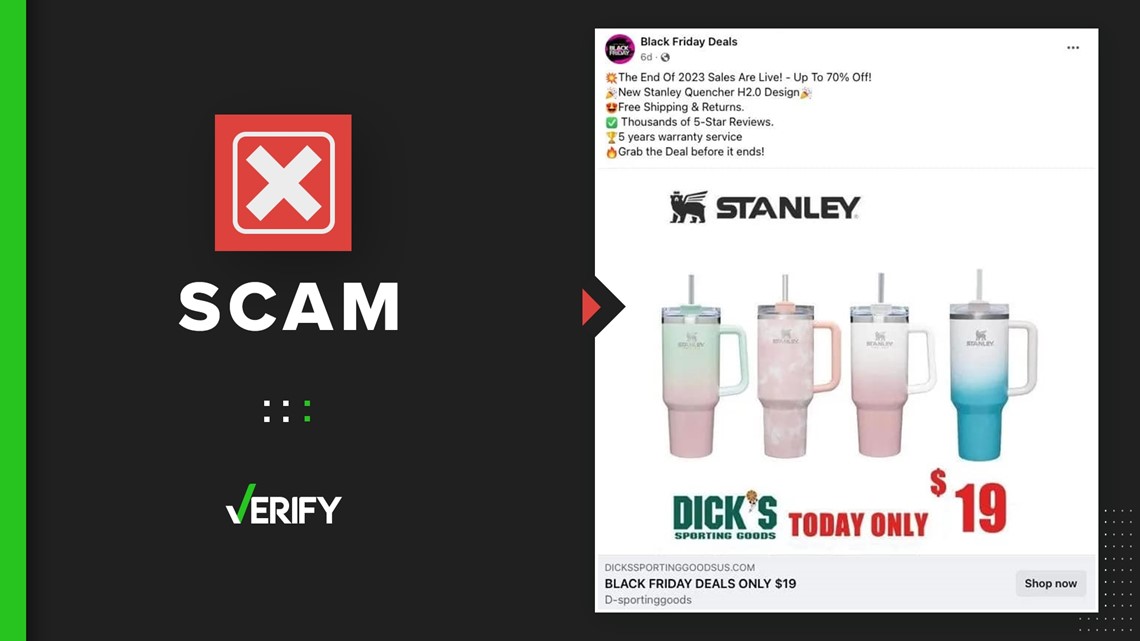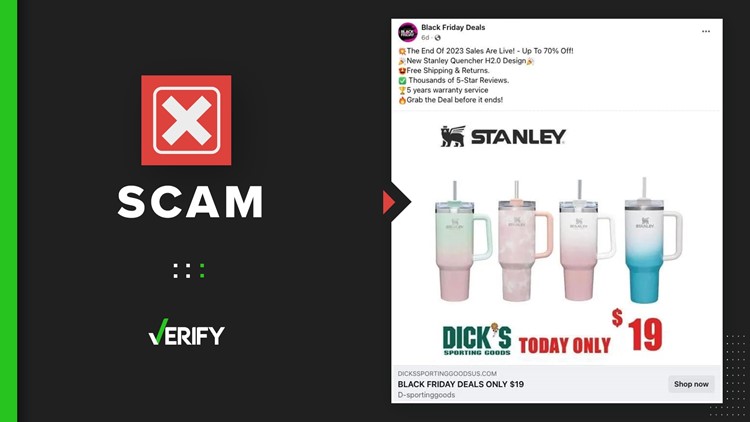Stanley cups — the stainless steel Quencher tumbler, not the National Hockey League championship trophy — are extremely popular right now.
On New Year’s Eve, many Stanley cup fans waited in line for hours to try to get their hands on limited edition versions of the popular tumbler that were being sold exclusively at Target. The cups quickly sold out in stores and online.
Within the past year, multiple people online say they’ve fallen victim to a Stanley cup scam after clicking on social media ads that sent them to fraudulent websites claiming to sell the cups at extremely discounted prices. Some of the ads claim to be from retailers like Dick’s Sporting Goods, like this one, which offers the popular Quencher tumbler for just $19.
Several recent news reports say similar scams are running rampant online amid the latest craze for the cup.
THE QUESTION
Are scammers pretending to sell Stanley cups at extremely discounted prices online?
THE SOURCES
- Stanley
- Better Business Bureau (BBB)
- Morton Grove Police Department in Morton Grove, Illinois
- Malwarebytes
THE ANSWER
Yes, scammers are pretending to sell Stanley cups at extremely discounted prices online.
WHAT WE FOUND
Scammers are pretending to sell Stanley cups at extremely discounted prices online to trick people into giving up their personal information and money.
How the scam works
Con artists create fraudulent websites or social media ads that appear to be from the official Stanley brand or big-box sporting goods stores, according to Stanley and the Better Business Bureau (BBB). The fake ads often redirected shoppers to fraudulent websites that looked legitimate where people entered their personal information and were charged for the item.
The BBB says some of the fake ads have claimed a store, like Dick’s Sporting Goods, was running a flash sale on the cups with discounts as low as half the original price or more. But after ordering, some buyers reported to the BBB that they never received a confirmation email, others said they received shipping information, but the product they purchased was never delivered, and several other victims reported getting confirmation that their cup had been delivered to a totally different address than the one they provided.
VERIFY found multiple ads on Facebook and TikTok claiming to sell the cups at extremely discounted prices. One example, which was posted on Facebook around Black Friday, claimed Dick’s Sporting Goods was selling the popular tumbler for $19.99.


But there are several red flags in the ad. First, the ad was not posted by the official Dick’s Sporting Goods or Stanley brand and didn’t appear on either company’s official Facebook pages.
Second, the ad doesn’t link to dickssportinggoods.com, the official Dick’s Sporting Goods website. Instead, it points to d-dickssportinggoodsus.com, a website that cyber security software company Malwarebytes blocked due to phishing in November 2023.
Malwarebytes said the website and payment processor were registered in Hong Kong at the time. We were unable to access the website on the Google Chrome browser.
Real Stanley Quencher tumblers typically cost between $20 and $60, depending on the style and size of the cup, according to prices listed on Stanley’s website. However, during the current craze, some people are reselling the real cups for hundreds of dollars on websites like eBay and Mercari.
How to avoid falling victim to the scam
Stanley, the BBB and the Morton Grove Police Department have all shared advice on how to protect yourself from falling victim to the scam. Their tips include:
- Only purchase items from sellers you know and trust. When making purchases online, only buy products from verified businesses, such as Stanley’s official website or through trusted Stanley retailers, like Target.
- Watch out for imitation websites. Scammers are experts at making lookalike websites to dupe shoppers into entering their personal and payment information. Always take a hard look at the URL to make sure you aren’t on a website that looks like a seller you know but is off by a word or even a single letter.
- Be cautious about social media ads. Many reputable businesses run social media ads but so do scammers. The BBB recommends sorting real businesses from scams by doing your research. Check out a business’ social media feed and website, and read reviews about the company on third-party websites to make sure they’re a legitimate business with real customers, quality products and good customer service.
- Stay extra vigilant around holidays. If a holiday is approaching (especially one where it’s customary to send gifts, like Valentine’s Day or Mother’s Day), stay alert to the possibility of scams. The BBB says to pay even closer attention if you’re doing last-minute shopping.
If you think you’ve fallen victim to an online shopping scam, you can file a complaint on the BBB's website or report it to the BBB Scam Tracker.


